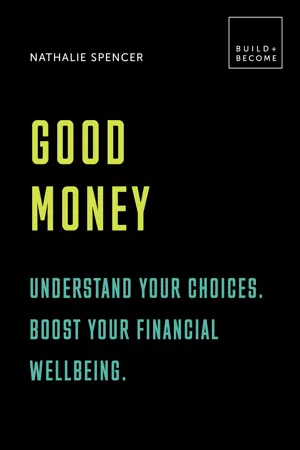EPILOGUE
Our relationship with money – the way we behave and the choices we make – is crucial to our financial wellbeing. These relationships are complex and the function of so many things, not least our own human psychology, the behaviour of others, the situations we find ourselves in, and our cultural and institutional frameworks.
For example, the power of social connections is such that even if we are not consciously seeking out advice from a friend, their choice of car – a Ferrari or Ford Fiesta, for example – affects our financial decisions whether we realize it or not. The policies of the country we live in will determine wage levels, costs of living and the shape of our retirement. Cultural values and previous experience will affect how we relate to money and financial priorities.
While it is worth developing a sense of control over our financial situation, our personal agency is not a magic wand. There are some things that we cannot change. Sometimes, even with the best intentions and a lot of effort, things go awry. So while we should all be striving for financial wellbeing, there is a balance to be found between recognizing the constraints of luck and context, and appreciating the effort we put in and the choices we make to improve our position, given the situation in which we live.
We should honour the balance inherent within the concept of financial wellbeing. We may make plans about how to use money while we’re cool, calm and collected, but actually use it – spend it – in the heat of the moment. These controlled cold states and impulsive hot states don’t always align, but we can honour both, by, for example, allowing ourselves to set commitment devices to keep us on track with savings goals, while also indulging guilt-free in a spontaneous opportunity to visit a friend.
Being good with money is neither being caught up in unsustainable consumption and frivolity, nor being resigned to severe minimalism and frugality. Having good money practices means making and sticking to plans to the extent that they serve us well, with enough slack in the system to be able to cope with, or even enjoy, unexpected turns in the road.
Understanding some of the weird, worrisome and wonderful ways we are with money, as explored in this book, may help on the journey towards financial wellbeing and being good with money.
While we should all be striving for financial wellbeing, there is a balance to be found between recognizing the constraints of luck and context, and appreciating the effort we put in and the choices we make to improve our position.
BIBLIOGRAPHY
INTRODUCTION AND CHAPTER 1
References and Further Reading
Brickman, P., Coates, D., & Janoff-Bulman, R., ‘Lottery winners and accident victims: Is happiness relative?’, Journal of Personality and Social Psychology, 36(8), 917 (1978)
Confer, J. C., Easton, J. A., Fleischman, D. S., Goetz, C. D., Lewis, D. M., Perilloux, C., & Buss, D. M., ‘Evolutionary psychology: Controversies, questions, prospects, and limitations’, American Psychologist, 65(2), 110 (2010)
Frey, B. S., & Oberholzer-Gee, F., ‘The cost of price incentives: An empirical analysis of motivation crowding-out’, The American Economic Review, 87(4), 746–755 (1997)
Gilbert, D., & Wilson, T. “Miswanting: Some problems in the forecasting of future affective states” in Thinking and feeling: The role of affect in social cognition, edited by Joseph P. Forgas, 178–197, Cambridge University Press (2000)
Gneezy, U., & Rustichini, A., ‘A fine is a price’, The Journal of Legal Studies, 29(1), 1–17 (2000a)
Gneezy, U., & Rustichini, A., ‘Pay enough or don’t pay at all’, The Quarterly Journal of Economics, 115(3), 791–810 (2000b)
Gneezy, U., & List, J. A., ‘Putting behavioral economics to work: Testing for gift exchange in labor markets using field experiments’, Econometrica, 74(5), 1365–1384 (2006)
Griskevicius, V., Ackerman, J. M., Cantú, S. M., Delton, A. W., Robertson, T. E., Simpson, J. A., Thompson, M.E., & Tybur, J. M., ‘When the economy falters, do people spend or save? Responses to resource scarcity depend on childhood environments’, Psychological Science, 24(2), 197–205 (2013)
Griskevicius, V., Redden, J. P., & Ackerman, J. M., ‘The Fundamental Motives for Why We Buy’, The Interdisciplinary Science of Consumption, 33 (2014)
Helliwell, J., Layard, R., & Sachs, J., World Happiness Report 2017 (2017): www.worldhappiness.report
ING International Survey,...




